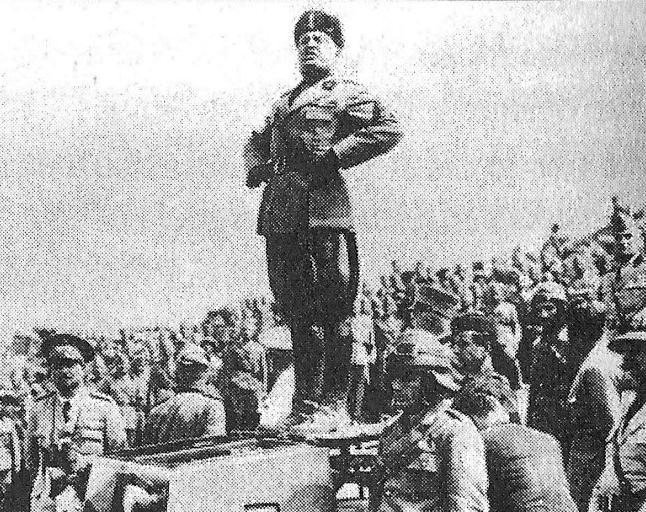
As is fashionable nowadays, last night's city council meeting in San Juan Capistrano saw members of the public comparing elected officials to mid-century fascist monsters. The tyrant of choice? Benito Mussolini.
]
Roy L. Byrnes was mayor of the city during the 1970s. Now, he's a tortoise-shell-glasses-wearing 85-year-old who thinks he smells something fishy on the city council.
“There's a lot of shenanigans going on,” he whispered to me, handing over a draft of his prepared remarks before heading up to the microphone to deliver them during public comments.
“I'm ashamed of this council,” he said. “You've been pushing the envelope to the edge of breaking the law.”
That's about when he busted out the Mussolini comparison. After all, that guy made stuff happen without public input, and we all know how that turned out.
He and fellow local gadfly Jim Reardon had spent the morning at the Orange County District Attorney's office, following up on a complaint they had filed against the council last summer. There, they learned that Sr. Assistant District Attorney William Feccia had met with San Juan city attorney Omar Sandoval, interim city manager Joe Tait and then-mayor Mark Nielsen on Nov. 5, 2009 to talk over whether the city had violated the Brown Act, California's open meeting law.
A letter sent by Sandoval to the DA on Dec. 8, Byrnes and Reardon assert, shows that the DA had found that the city council had indeed broken the law and Sandoval had agreed to change the council's ways going forwards.
Not so, say Sandoval and Nielsen. From the dais, Nielsen, now a councilman, bristled at Byrnes' and Reardon's comments. But because the violations that they were alleging had happened in closed city-council meetings, Nielsen said, he couldn't say exactly why they were wrong.
“Because I respect the Brown Act, I can't really discuss this,” Nielsen said to Byrnes. “But, I, sir, do not share your view. You are making assumptions beyond the facts.”
The dispute centers around a deal inked last year that provides the city with the option to buy up 116 acres of open space around a site that may house a yet-to-be-approved retirement community. In closed session, the council and the members of the city's open space finance subcommittee–which includes Orange County ex-sheriff Brad Gates–discussed the terms of the agreement, which dealt with not only the price of the land but also parking, water rights and land use. Those sorts of issues are meant to be discussed in open session, council critics say.
Sandoval says the DA's investigation, now closed, did not find the city had erred. Speaking to the Weekly this morning, he said DA Feccia wouldn't even tell him what, exactly, he had been investigating. But Sandoval surmised that it had to do with the option-agreement's provisions stipulating that the council and the developer would need to eventually come to agreements on parking and other issues related to the property. He could see that an outsider might think those deals were pre-approved in closed session. But all along, he says, the intention has been that they would be publicly drafted and vetted.
He says the correspondence between him and the DA's office proves he's right, and that Byrnes and Reardon simply have reading comprehension problems. “It's unfortunate that they want to read things their own way,” he says.
Byrnes and Reardon says that even if the council didn't technically break the law, it can't be a good sign that they came close enough to warrant a meeting with the DA. That meeting resulted in a request to the California Attorney General asking for a determination on how to interpret the Brown Act's language about confidential discussion of “price and terms of payment” for real estate.
“It's unseemly that this council is so close to the edge that we're going to the state,” Reardon said last night.
Update 2:44 p.m.: Just got off the phone with Feccia and Assistant District Attorney Michael Lubinski. Feccia says his investigation found no criminal wrongdoing on behalf of anyone with the city; criminal wrongdoing would require evidence that someone had purposefully discussed in closed session information they knew should be public. Because the option agreement was made public after it was approved, he says, they was clearly no intent on behalf of the council to keep anything it contained hidden.
On the question of whether discussions of land use in closed session should have been conducted in the open, Feccia says the law is unclear. No court case has tested the question other than Shapiro vs. San Diego City Council, which said that a city couldn't hold closed-session discussions about a land issues without having those discussions being tied to a the potential acquisition of a specific piece of real estate.
“This is a grey area of the law,” Feccia says. “The complainant [Byrnes] seems to think this is a bright line. It is not. If it was a bright line, we would have acted. “
Sandoval's Dec. 18 letter said that San Juan Capistrano would hold all future discussions about the option agreement in the open, but it's Feccia's impression–and Sandoval's contention–that that had been the city's plan all along.
Lubinski confirmed that he went over all of this with Byrnes and Reardon yesterday.
“We did not see anything sinister at all as to the conduct of the council members or the city arttorney or manager,” Lubinski said. “Everyone's trying to do the right thing.
We're real pleased with the results.”
We're real pleased with the results.”
Feccia-Letter to 12-18-09 Final
Feccia-Letter From 12-22-09

